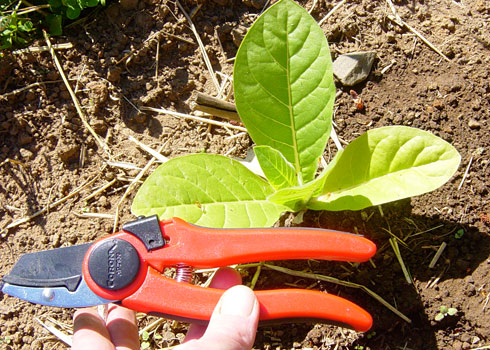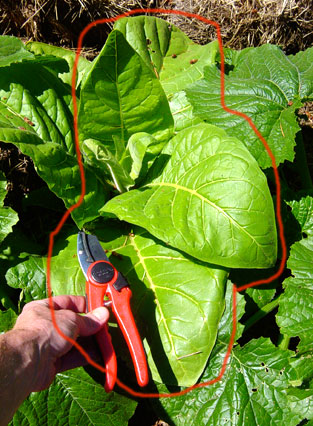Tobacco isn’t easy. The seeds are minuscule and take a long time to germinate. The seedlings are fragile, and grow fairly slowly for the first few months. Properly preparing the tobacco after harvest is an art, and requires an area that has the perfect temperature and humidity naturally or is climate controlled.

Sherazi tobacco curing in 2007
In 2007, I impulse-bought a packet of Sherazi tobacco seeds, and this hardy Turkish variety survived my bumbling first year of outdoor gardening, growing to five feet tall. Inexpert curing left this already very strong variety almost unbearably harsh, and the part that turned out best was only smokeable mixed in with some American Spirit. Most of it ended up getting mold on it as I shuffled it in and out of the house in the late fall, when the outside humidity is about a zillion percent and the inside humidity, thanks to the wood stove, is pretty much a negative number.
In 2008, I tried a variety called TN86, which is a more mild one similar to what is used in American cigarettes. The seedlings all died in the inadequately sealed greenhouse. Twice.
March 2009, with the greenhouse a bit tighter, I started a bunch of TN86 using commercial seed-starting mixture in 4″ pots, and some Sherazi from seed produced by my first crop. Germination was terrible with the 2-year-old Sherazi seed, but there are five of those now in the garden, along with about 25 of the TN86. They seem to be doing well.
I got my TN86 seeds from Victory Seeds, an Oregon company that specializes in preserving open-pollinated heirloom seed varieties. They have a basic tobacco growing guide here, and there’s plenty of information available online, so I’ll just relate my own observations that may be of help to someone trying to grow it in our damp, mild region.
- it has to be started early; March seems to work for me, but you MUST start it indoors or in a greenhouse this early; it will not tolerate freezes at either end of its cycle.
- sterile seed starting mix must be used – the seedlings are tiny and can take up to 3 weeks to come up. If there are any weed seeds in your mix, they will completely overcome any wispy little tobacco seedlings.
- Thinning – ok, this goes for all plants, but it is vital; you don’t get 2 half-size plants if you crowd them, you get two stunted and asymmetrical ones
- full sun – even in the greenhouse early on, the ones that were partially shaded showed it.
- be ready for silly questions; many people in our area have licenses to grow marijuana, but are surprised to hear that growing tobacco is legal.
- Tobacco REALLY likes loose, fertile soil. I know, what plant doesn’t? But see the photos below…
Tobacco planted in soil worked for the first time this year, with minimal compost worked in:
Tobacco planted in soil that’s been worked for two years, with a moderate amount of compost mixed in:

Tobacco planted in soil that’s been worked for three years, with a moderate amount of compost mixed in every spring:

And finally, monster tobacco growing in a foot-deep layer of composted goat bedding in a hay-bale raised bed (circled because it’s being crowded by zuccnini plants):

Feed your tobacco well!

When are you going to grow Tomacco?
Not while I’ve got goats grazing one rusty fence away from the garden – you know how they get on that stuff!
Hi Teri and Pete, Just stopped by to see how things are doing at the Pioneer farmstead. Teri, Linda said you may be in our area this month. Just had my cousin Lis from Denmark here for 6 weeks. She speaks only a little English and keept wishing she could carry on a longer conversation with the “English only” speakers. She loved one Sunday when we managed to visit with some Danish Friends and a couple from our church who spoke fluid Danish. We did a lot of catching up from some years in younger days, when her parents divorced and Lis and 2 other siblings were not allowed any contact with their Dad (my uncle), or any of the cousins from his side of the Family. We all thought it was so unfair and wondered if we’d connect later in our lives. We all did in 2007 and again now. It was great, and we even drove to Niagara Falls,thru Canada. See ya. Maybe . . . . Karen.
Pete: would you consider growing cigar-grade tobacco? I’ve gotten into cigars and thought “hmmmmm – fresh, American-grown tobacco?” 😉
Nope, I’ll probably never sell it…too much red tape and nonsense to be able to do that =(
But it should grow in your climate…how cool would it be to show up at the cigar bar and say “No thanks, I grew my own”?
Hi! You don't know me, but I was surfing the web and found your blog. You two are such an inspiration to me. I wish I can be like you someday. I wish I could visit you and see with my own eyes how you do it all, but that would be kind of creepy because you don't know me.Have a happy Valentine's Day!
Very cool. If yall are ever in Douglas County, pop by for a visit. Have you tried growing hops yet?
Andy and Lisa
Hey guys, just came across your website while searching for any Oregon tobacco growers / farms. I have a restaurant in Dundee, Ore. and am looking for some local tobacco, if possible, to use for smoking salmon. Is this something you could help out with or point me in a direction. Thanks for the time and hope to hear from you.
Hi Sean. I’m not aware of anyone producing tobacco for sale in Oregon. Seeds, starts, plants, and probably whole green leaves are treated like any other produce, but as soon as you process it by drying, trimming, curing, etc., it becomes a tobacco product subject to a ton of rules, taxes, and paperwork.
Maybe you could get a local farmer to raise a patch of it and then process it yourself? That’s mostly a matter of having a temperature and humidity controlled area to keep it. I have no idea if it would be legal to then use it commercially…but I don’t suppose they give a liquor tax exemption for spirits used in cooking =\